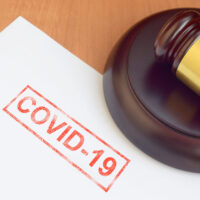Healthcare Fraud in the Age of COVID-19: New Challenges and Legal Considerations

The COVID-19 pandemic not only strained the healthcare system but also created new opportunities for fraud and abuse. From inflated billing practices to the misuse of government relief funds, healthcare fraud cases surged as federal and state authorities ramped up enforcement. For individuals and entities accused of healthcare fraud, understanding the evolving landscape is critical to building a robust defense and avoiding getting swept up in the frenzy of prosecutions. Below we discuss some of the changes COVID brought to the landscape of healthcare fraud cases. If you are a healthcare provider under investigation or facing charges of healthcare fraud in California, contact The Law Offices of Stanley L. Friedman to speak with a skilled and experienced Los Angeles healthcare fraud defense lawyer.
Emerging Trends in Healthcare Fraud Post-COVID
The pandemic introduced a wave of new fraud schemes, many tied directly to COVID-19 relief programs and pandemic-related healthcare services. Below are some of the most common types of healthcare fraud that have emerged:
- Fraudulent Use of Telemedicine
Telemedicine became a cornerstone of healthcare delivery during the pandemic. Unfortunately, it also became a hotbed for alleged fraudulent activity. Authorities have pursued cases involving providers billing for services never rendered or misrepresenting the type or amount of care provided via telehealth platforms. Telehealth was around before COVID, but now it is becoming an increasingly popular mode of healthcare delivery. - Improper Use of COVID-19 Relief Funds
Programs like the Paycheck Protection Program (PPP) and Provider Relief Fund (PRF) were designed to stabilize businesses and healthcare providers during the pandemic. However, some individuals and entities have been accused of misrepresenting financial needs or using funds for non-qualifying purposes. - COVID-19 Testing and Vaccine Fraud
Rapidly implemented testing and vaccination programs created opportunities for fraudulent billing and improper coding. Accusations include charging for tests not performed or offering fake vaccination cards to individuals seeking to circumvent mandates. - Phantom Billing for Pandemic Services
Some providers have been accused of billing for COVID-related treatments or procedures that were unnecessary or never administered. These cases often involve significant financial sums, drawing intense scrutiny from investigators.
Increased Enforcement Actions
Federal agencies, including the Department of Justice (DOJ) and the Office of Inspector General (OIG), have intensified their focus on healthcare fraud during and after the pandemic. The establishment of the COVID-19 Fraud Enforcement Task Force has further expanded investigative resources. Healthcare providers, administrators, and even executives may find themselves under investigation for fraud-related claims. This task force remains in full force and effect. Earlier this year, Attorney General Merrick Garland boasted of having charged over 3,500 defendants, seized or forfeited more than $1.4 billion, and filed more than 400 civil lawsuits. “Our work is not over,” he said as well, promising to continue efforts to investigate and prosecute pandemic relief fraud and recover assets.
Civil and criminal penalties for healthcare fraud can be severe, including substantial fines, loss of professional licenses, and imprisonment. Additionally, the government may pursue claims under the False Claims Act, which allows whistleblowers to file lawsuits on behalf of the government and potentially share in recovered funds.
Legal Considerations for Defending Healthcare Fraud Accusations
If you are accused of healthcare fraud in connection with COVID-19, the following considerations are critical to your defense:
- Intent and Knowledge
Fraud charges often hinge on whether the accused knowingly engaged in illegal activity. Demonstrating that errors were inadvertent or the result of evolving pandemic guidelines can be a key defense strategy. - Compliance Documentation
Maintaining detailed records of billing practices, patient care, and relief fund usage is crucial. Compliance with rapidly changing federal and state regulations during the pandemic can support a defense against fraud allegations. - Challenging Whistleblower Claims
Whistleblower lawsuits are a significant source of healthcare fraud allegations. These claims often require rigorous scrutiny to determine their validity. Evidence that whistleblowers misinterpreted practices or acted in bad faith can weaken the government’s case. - Expert Witnesses and Forensic Analysis
Healthcare fraud cases often involve complex billing systems and medical procedures. Expert witnesses and forensic accountants can play a vital role in explaining the nuances of billing practices and demonstrating the legitimacy of the accused’s actions.
How an Experienced White-Collar Defense Attorney Can Help
If you face allegations of healthcare fraud, working with an experienced white-collar criminal defense lawyer is essential. These cases often involve voluminous evidence, including billing records, emails, and compliance documents. An attorney familiar with healthcare fraud and the regulatory environment can help you conduct a thorough review of the allegations, identify weaknesses in the prosecution’s case, negotiate with federal and state authorities, and develop a tailored defense strategy based on the specifics of your case.
Contact The Law Offices of Stanley L. Friedman for Effective Defense Against Allegations of Healthcare Fraud in Los Angeles
The aftermath of the COVID-19 pandemic continues to shape healthcare fraud enforcement. With the government actively pursuing fraud claims, healthcare providers and businesses must remain vigilant about compliance and ready to defend themselves against potential accusations.
The Law Offices of Stanley L. Friedman has extensive experience defending clients against healthcare fraud and financial fraud allegations in California. If you are facing an investigation or charges, contact us today by calling our Los Angeles office at 310-598-2000 to discuss your case and learn how we can protect your rights and reputation.
